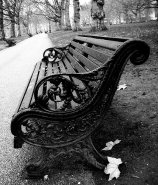Martin is grave and wired at the same time. He's been trying to find Mac and finally does, of all places, sitting on an iron bench in the park between the parish courthouse and the Catholic hospital. Mac will eat this one up.
"Hey—Sarah's been killed. I mean, that's what they think. They found blood on the astroturf at the church. APB's on her body. They've checked all the bayous and dredged the river." Mac is chewing something. "I know."
"Oh really?"
"Yeah."
He's curious that Mac's not more wound up over this. Mac folds the wrapper from whatever Burger King product he's consuming and tucks it into his pocket.
"What . . . were you talking to one of the cops?"
"Maybe." Mac's eyes are calm, oddly diverted—not that maniacally straightforward gaze Martin knows so well.
"Figured you'd be out searching with them."
No response. Then, as if only now recognizing Martin, Mac slides into his old self, off on a typical tangent. There's a new used Plymouth Roadrunner on one of the Louisville lots he's got his eyes on. The high, rectangular spoiler that looks like something on an airplane. He asks Martin if he wants to ride along and look at it.
"Not now. You making deliveries?"
"Nah. Not anymore." Mac is smiling. Weird. Martin prods him for what's going on.
"Well," Mac offers, "You seen Kelly?"
"No. Why?"
Mac points toward the steps in front of the sheriff's office. "That's where she just interviewed me for the television. It's gonna be on at six."
Mac inside Martin's apartment. They're watching the end of the national news, a humorous tag on the ways oppressed midwest farmers are coping with foreclosures and their hostility toward bankers by sewing and knitting clothes for barnyard animals, such as favorite pigs. "Want a coke? Or a brew?" Martin says, rising.
"A coke please."
There are commercials, and the six o clock intro-montage of scenic local shots. A brief rundown of upcoming stories, and then immediately into the feature. There they are, upon the courthouse lawn, Kelly and Mac.
Mac is on television.
First, the closeup of Kelly; she gives a brief factual rundown so far, then introduces Mac by his full name. His hesitation proves awkward at first, then he's fine, at ease, telling the story as if he were sitting at the Coney Isle with friends. Kelly interrupts, prodding for the exact location. Mac describes Black Bayou Lake, about five miles north of the city, and the surrounding crop fields.
"I was just driving out to the lake to toss a pole, listening to the radio like everybody else, and they wanted people to keep an eye out. Since I got let go and don't have a job, I got plenty a' time now, for sure. If anybody out there's looking, just let me know (waves.) She was uh, laying there, kinda near where they put the boats in the lake. Under the cotton stalks."
"Fishing? You fishing?" Martin said.
Mac motioned for silence, watching the screen. Kelly asks if Mac had personally known the victim. He pauses uncomfortably, as if it were something he'd already explained to her, but smiles for the camera and audience out there. No, he'd never shaken her hand but indeed knew who she was, what kind of person she was. Kelly inquires delicately of the state in which he found her.
"She was nekkid," he nods, and then the interview is over. The anchor finishes the segment and then they cut to a police report on the search for the killer (several leads exist) and finally wrap up with various tributes to the fallen samaritan from local personalities.
Martin lowers the sound with remote control, finishing his can of Old Milwaukee. Mac's face is flushed; he cannot help but grin. "I guess she had to act like she didn't know me personally or something—can't do that on television, huh?"
Martin nods absently, stepping to the kitchen. "Mac. Are you going to tell me what's going on?"
"Hey—I could give you an interview for the paper, Martin."
"I'm not writing the story—somebody else is on that one." Evasive.
"Ahh—too bad."
Martin turns and looks at Mac a while. "Look. I'm not asking because of my job. This is me, asking you."
"I got lucky."
"I can just see you holding a fish. About like you would a pipe bomb. How did you get to Black Bayou Lake?"
"It's off 165."
"What road did you turn off on?"
Mac is a blank. "Uh, right offhand . . ."
"Any street in the city limits and you know the name and what it used to be called and how many houses are on it and what their numbers are. But you can't say Dufresne Road because it's up in the north end of the parish and you hate anything rural and you've never been on it before today. Am I right?"
Mac is visibly torn. "I can't say nothing else. That's how it happened."
"Didn't I tell you already this isn't going in the paper? Aren't we friends?"
Mac seems on the verge of tears, hearing Martin say that, as if an echo from many years ago. "I always told people we were."
Martin begins to ask more, then doesn't. Some instinct tells him to leave this alone for the time being. He says he's got to go to the office and work a while, and after Mac leaves (Martin almost finds himself hugged, necessitating some fancy footwork) he opens another beer, dials the phone and hangs up on his sister.


